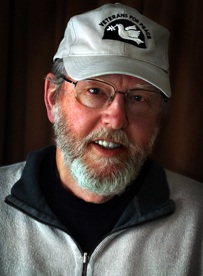When he walked into the oval office for the first time he must have been hit smack in the face with two daunting realities: One, the US economy was a basket case thanks to a plutocratic culture of financial Ponzi players who had just tripped over their tumescent greed. And, two, the nation was up to its neck in two wars of occupation and the military was a powerful runaway train ruled by profiteers and career-minded generals.
As anyone in the so-called "peace movement" knows, this monster Eisenhower called the Military Industrial Complex gives no quarter, and it always seems to grow bigger and bigger like something out of a child's nightmare.
So, back to my little story: The ambitious kid from Jakarta has figured out how to be President, but he now has to figure out how to tame this voracious monster and make it purr like a kitten in his lap. Enter Vice President Joe Biden, the "working class" Democratic senator from the Corporate State of Delaware. Joe has the answer.
"Cut all this expensive counter-insurgency crap and just concentrate on whacking the right people," he tells the kid from Jakarta. Joe looks around the room with his signature self-satisfied smirk and then whispers into Obama's ear: "Listen, man, this will work. This is a big fuckin' deal."
The legislative history of the Drug War reveals that, following the defeat of Jimmy Carter and the ascendancy of Ronald Reagan, Senator Biden fashioned himself into one of the key architects of the US Drug War we know today. Ted Gest covers it well in his book Crime & Politics: Big Government's Erratic Campaign for Law and Order. He writes about "Biden's aggressive manner ... to make crime a winning issue for Democrats." Carter had tried things like legalizing marijuana, and Democrats were tagged as soft on crime; Biden wanted to change that and make the issue work for them. "Give me the crime issue," Gest reports Biden saying in Democratic caucus meetings, "and you'll never have trouble with it in an election."
How did so much crime legislation pass in the partisan 1980s? Gest says one key was the "important personal relationships" between Biden and other senators, especially Strom Thurmond, the Republican Senate Judiciary Chairman before Biden himself assumed that role in 1987.
A master of bi-partisan wrangling, Biden pushed for the creation of the cabinet level "Drug Czar." He pushed through huge Crime Bills that gave federal money to local police forces, strengthening the links between the federal and local levels. He helped streamline federal police operations and boosted linkages with the military. He generally operated as a liberal check on Republican excesses, though he was also blindsided by them.
In the 1984 Crime Bill, for example, a powerful and controversial forfeiture law was passed that, Gests writes, "skewed the priorities of law enforcement at all levels." The new law allowed police departments everywhere to seize the property of anyone simply charged with a drug crime; conviction was not necessary. The law fostered a litany of horror stories of innocent people's property seized and not returned. For cops, it was like manna from Heaven and a means to finance all sorts of new military tools. It took 16 years to reform the bad law.
The legislative momentum that Biden and others were riding was all going the way of more police and military empowerment in the War On Drugs. Meanwhile, Harm Reduction and other demand-oriented anti-drug programs -- the things Latin Americans want us to focus on -- went hungry.
The criminologist Joel Rosch in a 1985 essay called "Crime As an Issue in American Politics" cites Barry Goldwater in his 1964 run for President as the first politician to use crime as a national campaign issue. According to Rosch, Goldwater used crime to "symbolize more than people being robbed or assaulted." Goldwater and his advisers felt the crime issue spoke to "a general feeling many Americans had about the growing disorder and perceived anarchy in American society." To be tough on crime "would put an end to the growing chaos in American society." Many felt it was code to fight civil rights activism.
While Goldwater lost the election to Johnson, "he succeeded in setting the scene for debate about crime." Rosch concludes that, symbols aside, the only truly effective way to address crime is to involve citizens and communities in the criminal justice process. Unfortunately, Goldwater set off a trend that has gone the other way, often turning police culture and poor communities against one other. The problem is beefing up police culture actually exacerbates the drug crisis by creating an us-versus-them, "war" mentality.
After decades, the Drug War created and defended by Biden and others has not staunched the flow of drugs north (it's presumed goal) and, instead, has contributed to corruption and murderous chaos in Mexico and elsewhere. The talk now is of Mexico as a "failed state" ruled by ruthless drug gangs with military and police corruption a powerful and inherent way of life. To the south, in Honduras, after a 2009 coup opened the way, US Special Ops units are now being based there to stop drug shipments north.
It's the marriage of The Wars On Drugs and Terror, and it's only a matter of time before the marriage made in Hell spawns a truly frightening offspring.
Liberal Democratic leaders like Joe Biden are the match-makers for this marriage. Besides his work fostering the War On Drugs, Biden has been one of the most vocal proponents in the Obama administration for a "counter-terrorism" doctrine versus the well publicized "counter-insurgency" doctrine touted by General David Petraeus.
(Note: You can view every article as one long page if you sign up as an Advocate Member, or higher).




